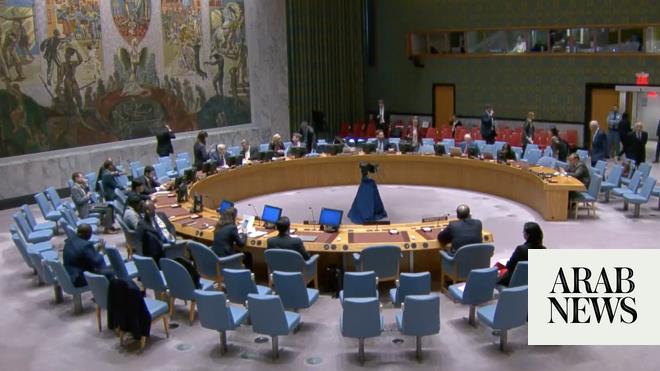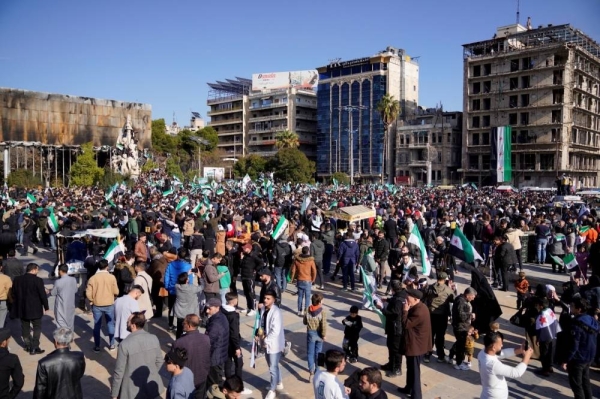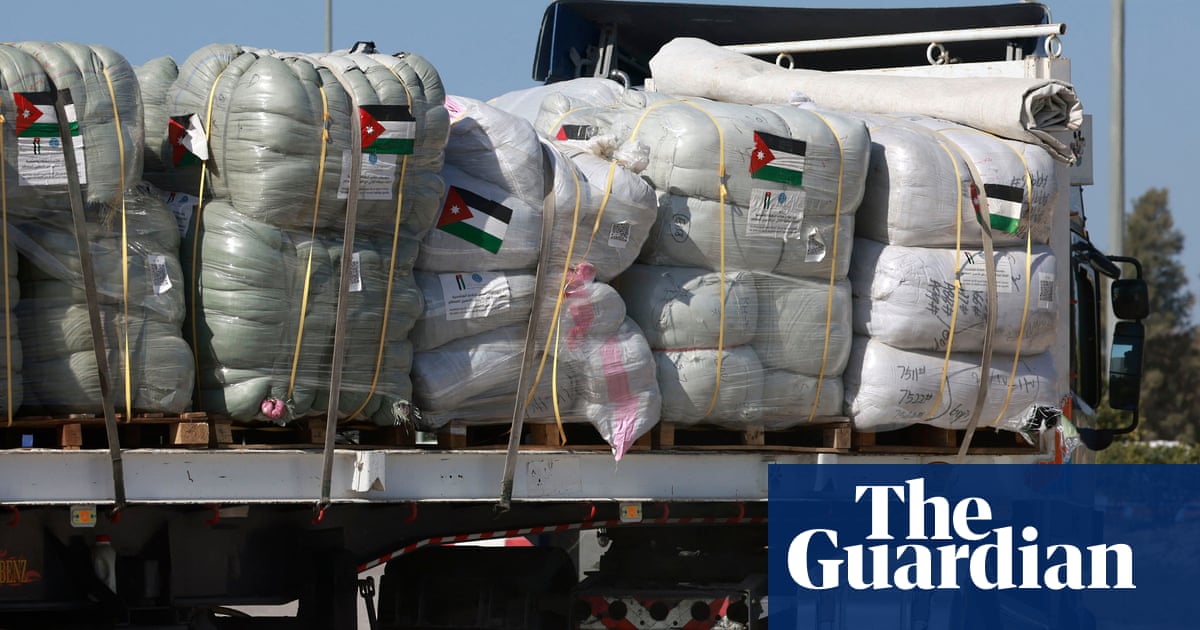
Geir Pedersen warns that though the regime of former president Bashar Assad has been toppled, the ‘conflict has not ended yet’
Council members denounce Israeli authorities for illegal seizure of parts of Syria, call on them to withdraw forces and respect nation’s sovereignty
NEW YORK CITY: The UN’s special envoy for Syria has called for “broad support” from the international community for Syria and an end to crippling economic sanctions, to aid the reconstruction of the country after almost 14 years of civil war.
Speaking from Damascus on Tuesday, Geir Pedersen briefed members of the UN Security Council on the current situation in Syria. It was the council’s first open meeting about the country since the fall of dictator Bashar Assad’s regime on Dec. 8.
The UN’s humanitarian chief, Tom Fletcher, also appealed to all states to ensure “sanctions and counterterrorism measures do not impede” aid operations in Syria, which continues to suffer the effects of a humanitarian crisis that is one of the most dire in the world.
US, UK, EU and other international authorities imposed severe sanctions on Syria after President Assad’s crackdown on pro-democracy protests in 2011 spiraled into civil war.
They also slapped sanctions on Hayat Tahrir Al-Sham — the militant group that spearheaded the takeover of Damascus this month that ousted Assad — more than a decade ago. At the time, HTS was Al-Qaeda’s official affiliate in Syria but it broke ties with the terrorist group in 2016. However, it remains on the UN Security Council’s sanctions list, subject to a global assets freeze and arms embargo.
Western countries are now grappling with the question of how best to respond to the evolving situation in Syria now that HTS is in power. Though the group has softened its rhetoric, it is still widely labeled a “terrorist” organization by authorities in the West.
Pedersen said: “Concrete movement on an inclusive political transition will be key in ensuring Syria receives the economic support it needs.”
He noted the steps that are being made to achieve a peaceful and orderly transition of power in the country, including efforts to ensure the former government’s ministers remain safe, and calls for state employees to continue their work.
“This provides a strong first basis but it is not, in itself, enough,” Pedersen told council members. The transition must also be “credible and inclusive, including the broadest spectrum of Syrian society and Syrian parties, so that it inspires public confidence,” he added. He also stressed the need to draft a new constitution, and for free and fair elections.
Although events this month have sparked hopes of a real opportunity for peace, economic stability, accountability and justice in Syria, Pedersen warned that many people remain apprehensive about the “enormous” challenges that lie ahead.
“I worry that if this is not handled right, by both the Syrians and the international community, a turn for the worse again is possible,” he said.
Even though Assad is no longer in power, the “conflict has not ended yet,” Pedersen continued, highlighting as a particular concern the clashes between Turkish-backed and Kurdish groups in the north of the country.
“Although there is stability in many parts, and law and order improved, such stability can be fragile, with many front lines and open hostilities still ongoing in northeast, where civilians are being killed, injured and displaced. Such an escalation could be catastrophic,” he said.
Meanwhile, Israeli forces have carried out more than 350 strikes against military facilities, equipment and supplies across Syria since the fall of the Assad regime and the attacks continue, including a major assault on Tartus.
“Such attacks place a battered civilian population at further risk and undermine the prospects of an orderly political transition,” Pedersen said as he called on Israeli authorities to halt all “illegal” settlement activity in the occupied Syrian Golan.
“Attacks on Syria’s sovereignty and territorial integrity must stop,” he added.
Pedersen said he has held talks with Syria’s new de facto leadership. He also visited the “dungeons” and “torture and execution chambers” of Sednaya prison, which he described as “a testament to the barbarity of the fallen regime towards its own people.”
He said that seeing this firsthand served as a stark reminder of the importance of transitional justice, of clarification of the fates and whereabouts of all those still missing or who were disappeared, and of ensuring due process is followed in criminal prosecutions as a necessary safeguard against acts of revenge.
“Without this, Syria and Syrians will not be able to heal,” Pedersen added.
As an urgent first step, he called for the preservation and protection of all evidence and materials related to alleged crimes, and of the sites of mass graves.
Fletcher, the UN humanitarian chief, told the Security Council that the humanitarian crisis in Syria remains one of the worst in the world, with 17 million people in need of support, more than 7 million displaced across the country, and millions more living as refugees.
Nearly 13 million people already face acute food insecurity, he added, and recent events have “only added to these needs.” More than a million people were displaced in less than two weeks during the events that culminated in the fall of the Assad regime, he said, and hundreds of civilians were killed or injured, at least 80 of them children.
Health services and water supplies have been interrupted and more than 12,000 schools temporarily closed, affecting millions of students. As borders and commercial routes remain closed, there are shortages of bread and fuel, Fletcher added.
“The flow of humanitarian support was severely disrupted, with most organizations temporarily suspending operations. Several warehouses have been looted. Multiple aid workers lost their lives,” he said.
He lamented the fact that the effort to fund aid for Syria, “the largest country appeal in the world,” is one of the most poorly supported.
“With just two weeks left in 2024, it is less than a third funded, the largest-ever funding gap for the Syria response,” Fletcher said. “Now is the time to invest in the Syrian people.”
Russia’s ambassador to the UN, Vassily Nebenzia, said Syria’s future is “currently quite uncertain given the internal lack of stability and the palpable threats to Syria’s sovereignty and territorial integrity.”
He warned that there is “a real risk of Syria becoming a number of cantons, broken down by ethnic and religious characteristics,” and called on the Syrian people to make every effort to ensure that an inclusive national dialogue takes place, without separating people into “losers and winners.”
Slovenia’s deputy permanent representative to the UN, Ondina Blokar Drobic, told the council that a prosperous future for Syria will depend on a credible and inclusive political transition, and an inclusive Syrian-led and Syrian-owned political process. She emphasized the necessity of participation by women in this process.
Drobic also underscored the obligation on all parties to take a stand against terrorism, as she stressed the importance of preventing Daesh and other terrorist groups from reestablishing their capabilities, and of denying them safe haven.
Syria’s caretaker authorities “must also respect Syria’s other international obligations, including the Chemical Weapons Convention,” she added.












